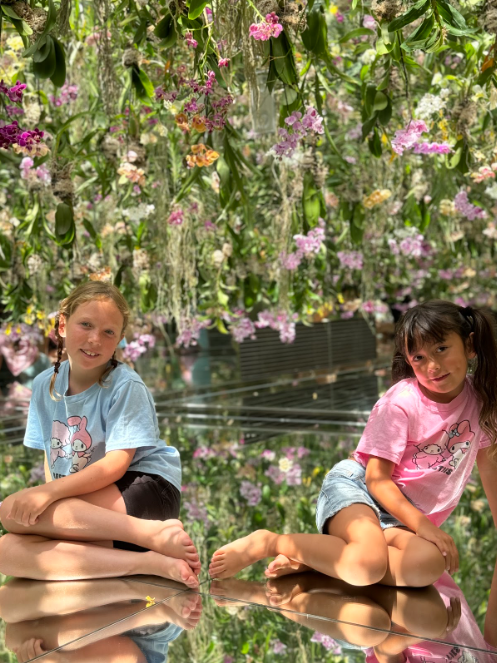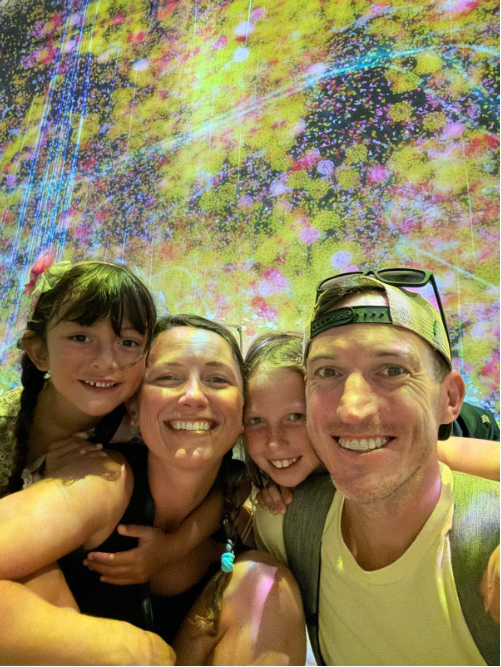
Let’s Build Strong Sibling Relationships: A Guide for Blended Families
We’ve been talking about Blended Families lately. And mostly I’ve been talking about it from a Parenting point of view. But there are other relationships in a blended family, right? I won’t go into the couple relationship right now– that is a whole other topic! But what about the SIBLINGS? Sibling relationships can be a little challenging even under the BEST circumstances. Most parents dream of their kids being best friends, but the changing dynamics of a blended family may feel difficult to navigate. It can feel like there is so much at stake! Making sure that the love between the new couple trickles down to the kids, too, is a key part of building a new Family.
I do have two really solid tips I can give you that will help, and they balance each other out.

Combating the Negative Impact of Social Media on Young Kids
In today's digital age, social media is woven into the fabric of daily life, but for young children, it often poses more risks than rewards. From unrealistic beauty standards to the lurking dangers of cyberbullying, the potential harm is undeniable. While I’m not here to wage war against platforms like TikTok, I’m joining the growing chorus of mental health experts urging parents to delay social media use until at least age 13. But here’s the key: this isn’t about taking a heavy-handed approach. Instead, let’s explore how we can prepare our children to navigate this online world with wisdom, empathy, and healthy boundaries.

How to Nurture Your Daughter's Self-Image: Everyday Tips
As a mom, I want what is best for my daughters… In a blended family, fostering independence, self-confidence, and self-love in these girls is a huge priority for me. Girls and women still face major challenges to mental/emotional health and personal success, even though things are better for our girls than they were for ourselves, and our mothers and aunts. Props to the women who’ve paved the way so far, and I’m especially loving the most recent vibe of absolutely amazing women in the headlines. Leadership, body positivity, mental health self-care– all of this is on display and I am so excited about it. BUT we definitely still have a long way to go.
So jump on my bandwagon today, and let’s talk about some practical habits you can develop to be a role model and a full-blown cheer squad for the young girls in your life!

The Unique Challenges of Step Parenting: Tips from the Trenches
Stepparenting, a topic very much on my mind lately, (if you haven’t already noticed) is uniquely tough. Let’s take a look at a few of the unique challenges that stepparents face and talk about some strategies for meeting and overcoming those challenges.

Navigating the Emotional Landscape of Blended Families: A Deeper Dive
Remember when we discussed the importance of emotional support for children in blended families? As we explored in our previous post, providing a safe and understanding environment for children to express their feelings is crucial for their well-being. This emotional support can come from both biological parents and stepparents, creating a more nurturing and supportive atmosphere for everyone involved.
Building on that foundation, let's delve deeper into the specific emotional challenges children may face in blended families and how to address them effectively.

Blending Families after the Chaos- Evidence-Based Interventions for More Successful Family Outcomes
Blending families can be a complex process, especially when high-functioning ambitious families with a lot of moving parts. These children & adults, who typically exhibit strong cognitive and adaptive skills, might still face unique challenges in adjusting to new family dynamics. Successful integration demands careful planning and evidence-based interventions to foster harmony and positive outcomes for all family members. In this blog, we'll explore effective strategies grounded in the latest mental health research to assist in blending families where high-functioning children are a key component.

Rekindle
We’re talking about diagnosing and healing from BURNOUT this summer– partly because it’s a part of my personal journey right now, and partly because it is, or soon will be, a national epidemic that we would be foolish not to address, as mental health professionals. Today I want to talk about rekindling your vision after burnout.

Professional Burnout: 8 Steps to Heal and Restore
Professional burnout is a significant issue affecting many adults today. Especially professional parents. Here is an accessible quick guide on signs & symptoms, plus eight ways to cope with suspected or diagnosed extreme professional burnout.


Happy Father’s Day, Single Moms!
I know this day is usually reserved for Dads– whether we are celebrating them, mourning them, dealing with their absence or abuse, or contemplating how to be the dad you want to be, BUT. Today I thought I would turn that upside down for a minute and address single moms. The parents who are doing their best to be BOTH Mom and Dad to their little ones. I want to encourage you, celebrate your efforts, and give you a few little tips for getting through this holiday with your child– especially if they are a little too young to fully grasp the situation.

Why Pride Matters for LGBTQ Mental Health
June is Pride Month and I am celebrating the courage, joy, and IDENTITY of my LGBTQ neighbors and friends. I want to kick off the month by talking a little bit about why Pride Month is so crucial for lgbtq mental health.

Clarity Check-Ins and the Power of The INTENTIONAL Life
I’ve been throwing around the word “Clarity” on this blog a lot this past month. Why is “Clarity” such a vital part of successful recovery, you might be wondering? I think about it this way: Clarity is the antonym, or opposite, of Denial. Denial, self-delusion, the inability to face the reality of your situation; this bad thought habit may be what got you into a life of addiction/compulsion to begin with. Clarity, truth, and honesty; these are the characteristics that will help guide you through a successful recovery and set you on a path of lifelong sobriety.

The Importance of Boundaries for a Successful Recovery
We started our series on addiction/compulsion in April; National Alcohol Awareness Month. And now it’s May: National Mental Health Awareness Month. I think it’s fitting that our series bridges these two recognitions, since nurturing mental health is so vital for successful addiction recovery. So far we’ve discussed how to rewire your reward system with healthier forms of “escape” and stimulation, the role of taking time to find clarity and appreciate the long view of your progress in recovery, and laid out some practical steps for how to build a Well-Designed Life. Today I want to talk about something equally important, but actually sometimes difficult to define and discuss. Boundaries.

How To Live A Well-Designed Life
Last week we talked about the importance of clarity and vision. Today I want to talk about the practical process of implementing that vision into a Well-Designed Life. I’m specifically addressing individuals in recovery, and those of you who are exploring the possibility that you have some unhealthy habits and compulsive behaviors that might need to be addressed. But I also hope that this conversation can be widely appreciated by anyone who is seeking to implement a more deliberate, conscious way of living.

A Short Guide to Finding Clarity and Nurturing Intentionality
The world we live in isn’t really set up to nurture a mindful, intentional approach to life. It’s really no surprise that so many of us are struggling with addiction/compulsion behaviors as a stress and trauma response. The body does what it can to survive in a world that insists we go and go and go, ignoring the signs that we need to rest, heal, re-set, or refocus.
But you can be different. You can rebel against this. You can make the time and space for Mental and Emotional Clarity. I promise you, it will pay dividends in successful recovery from addiction, increased productivity, quality of life, and a deeper sense of wellbeing.

Rewire Your Reward System And Move Beyond Escapism
When you get to the end of a long day, what’s the first thing you reach for? Your phone? A sugary treat? A case of beer? Are there fifteen tabs open on your laptop– each with a shopping cart full of “treats”? What about your weekends? Are you one of those people who just can’t stand to ever leave work behind? Would you believe me if I told you that all of these instincts things stem from the same brain impulse? Read on!

Let’s Ditch the Control Freak Label and Heal Your Trauma, Instead
Control Freak. Yikes. That’s a harsh term. Have you ever had that label slapped on you? If you have, you’re not the only one… A lot of high-achieving men and women get accused of being overly controlling, simply because they are in charge, organized, and driven individuals. Just because you are IN control; that doesn’t make you a Control Freak. You have my permission as a therapist to reject that label!
But… there is actually a problematic desire for control that can be a result of unresolved trauma. It often goes hand in hand with its sidekick: People Pleasing. If you are actually struggling on a hamster wheel of anxiety, stress, high expectations, and the sense that everything is OUT of control, then lean in. This blog post is for you.

Emotion Regulation
Welcome back to our series on the effects of unresolved relationship trauma. We've already discussed how trauma can trigger anxiety, lead to codependency, and even contribute to substance abuse. Today, let's explore how unresolved trauma can directly impact your ability to manage your emotions in a healthy way.

Your Starter Guide to Stopping the Relationship Pain/Substance Use Cycle
It’s time to talk about a difficult but important topic: the link between relationship trauma and substance abuse. We all know that relationships can be incredibly powerful. They can bring us immense joy, love, and support. But as we’ve been discussing here on the blog lately, they can also be a source of deep pain and emotional turmoil. Sometimes, when a relationship is unhealthy or abusive, it can leave us feeling trapped and helpless.

Codependency
Codependency doesn’t happen in a vacuum, either. It’s another one of the unhealthy coping mechanisms we’ve been talking about; usually caused by some deep attachment wounds from childhood or previous relationships where you weren’t given the kind of emotional connection and validation that you needed. And since it’s not a healthy, intrinsic part of human relationships, it is something we can change and heal. So first, let’s recognize what codependency looks like.
